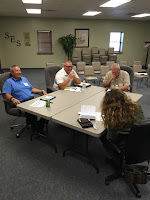Several years ago NSBA asked experienced board members to share insights about their first year of service on a school board. The following ideas may help make the transition a little more productive.
Good luck and enjoy your service to public education.
- Get to know what your role is as a board member, develop yourself in many ways, set goals for yourself, be positive, know your limits, and above all listen. -- Jo Ann Beamer, board member, Ohio
- Do not be in a hurry to do something. It takes time to develop governance skills. -- Jill Wynns, board member, California
- I am only one of five voting members and not a power of one. -- Richard Asadoorian, board member, California
- Read and learn your board policies and state law regarding school boards. -- Ginny Moe, board member, South Carolina
- Remember, you were elected by citizens. Try to carry their voices and needs. -- Cynthia Shabb, board member, North Dakota
- Once a decision is made you should support the decision. If you disagree, try to change the decision. -- James R Dykeman, Jr., board member, Massachusetts
- If it is not good enough for my child, it is not good enough for any child. -- Bill Kress, board member, New York
- Read your school state laws and codes and ask questions about anything you don't understand. -- Terisa Fitzpatrick, board member, Illinois.
- As long as you are working in the best interest for the students, vote your conscience. -- Mary Mathes, board member, Indiana
- Read everything and to be prepared. -- Iris Lane, board member, Virginia
- If you feel like you are overwhelmed, you are micromanaging. -- Jim Butt, board member, Pennsylvania
- Be respectful of the opinions and positions of your fellow board members. -- Scott M. Johnson, board member, New York
- Your primary constituents are the students -- who do not vote. -- Charles Wilson, board member, Virginia
- Change takes time. Start slow and build to fundamental change. -- Sheldon Wigdor, retired board member, California
- Don't surprise your superintendent or the staff with questions at board meetings. Give them a heads up that you will be raising an issue so that they will be prepared to speak about it. -- Jeff Phillips, board member, North Carolina
- Don't take things personally. -- Vanessa hatcher, board member, Illinois
- Recognize the difference between policy and procedure. -- Bill Culbertson, board member, Kentucky
- Create alliances with each board member, learn what they care about and how to present ideas to each and every person to speak to their beliefs. -- Mary S. Cunningham, board member, Virginia
- Vote based on facts and data, rather than getting caught up in the politics or trading votes. -- Kyle K. Walker, board member, Oregon
- Be open to listen from all stakeholders before making up your mind. -- Raymond Eng, board member, New Jersey
- Go to the state association certified training as soon as possible. -- Peggy Taylor, board member, Missouri
- At Board meetings don't respond immediately to criticisms or complaints -- Kathleen Oxberry, board member, Pennsylvania
National School Boards Association


